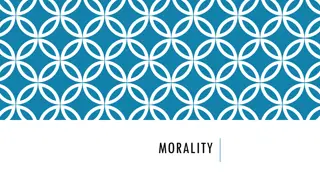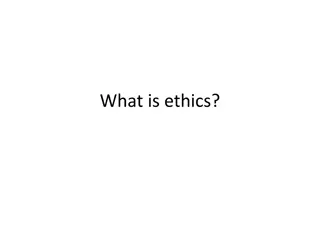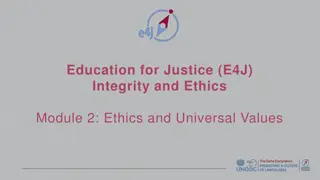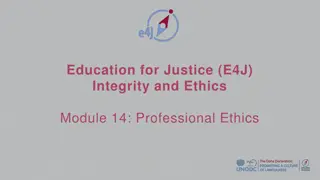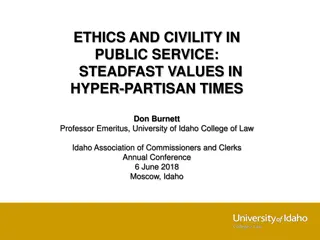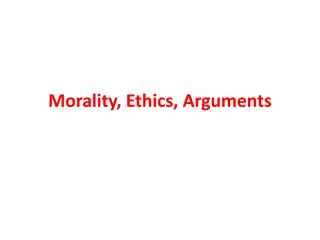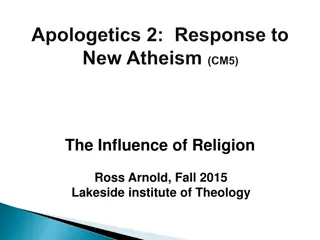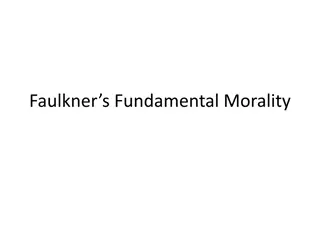Thought-Provoking Questions on Morality and Ethics
Explore a series of intriguing ethical dilemmas and moral quandaries, such as the concept of freedom in confinement, the ethics of wildlife conservation, the justice system's focus on criminals versus victims, forgiveness, leadership qualities, and belief systems. Reflect on these questions to deepen your understanding of ethical principles and decision-making.
Download Presentation

Please find below an Image/Link to download the presentation.
The content on the website is provided AS IS for your information and personal use only. It may not be sold, licensed, or shared on other websites without obtaining consent from the author.If you encounter any issues during the download, it is possible that the publisher has removed the file from their server.
You are allowed to download the files provided on this website for personal or commercial use, subject to the condition that they are used lawfully. All files are the property of their respective owners.
The content on the website is provided AS IS for your information and personal use only. It may not be sold, licensed, or shared on other websites without obtaining consent from the author.
E N D
Presentation Transcript
Are you more free if you are locked in a room, or if you never want to leave it? Can you tell me more? Can you say why? So [repeat the question]? Can you give me an example? How do you mean? Why is that important?
If you were charged by the last rhino on earth, would it be OK to shoot it? Can you tell me more? Can you say why? So [repeat the question]? Can you give me an example? How do you mean? Why is that important?
Is it better to spend money on jailing criminals, or on compensating victims? Can you tell me more? Can you say why? So [repeat the question]? Can you give me an example? How do you mean? Why is that important?
Why do we do the right thing when nobody is watching? Can you tell me more? Can you say why? So [repeat the question]? Can you give me an example? How do you mean? Why is that important?
Do tigers have a right not to go extinct? Can you tell me more? Can you say why? So [repeat the question]? Can you give me an example? How do you mean? Why is that important?
Is it ever wrong to forgive someone? Can you tell me more? Can you say why? So [repeat the question]? Can you give me an example? How do you mean? Why is that important?
Can a bad person be a good leader? Can you tell me more? Can you say why? So [repeat the question]? Can you give me an example? How do you mean? Why is that important?
How do you know what to believe? Can you tell me more? Can you say why? So [repeat the question]? Can you give me an example? How do you mean? Why is that important?
How much is it fair to expect the rich to help the poor? Can you tell me more? Can you say why? So [repeat the question]? Can you give me an example? How do you mean? Why is that important?
Is meaning what I meant to say, or what you understood? Can you tell me more? Can you say why? So [repeat the question]? Can you give me an example? How do you mean? Why is that important?
What would a computer have to be able to do to deserve to a vote in elections? Can you tell me more? Can you say why? So [repeat the question]? Can you give me an example? How do you mean? Why is that important?
Is maths invented or discovered? Can you tell me more? Can you say why? So [repeat the question]? Can you give me an example? How do you mean? Why is that important?
When should ideas belong to everybody? Can you tell me more? Can you say why? So [repeat the question]? Can you give me an example? How do you mean? Why is that important?
When is copying a good thing? Can you tell me more? Can you say why? So [repeat the question]? Can you give me an example? How do you mean? Why is that important?
Is art useful? Can you tell me more? Can you say why? So [repeat the question]? Can you give me an example? How do you mean? Why is that important?
Can a tune (no words) mean something? Can you tell me more? Can you say why? So [repeat the question]? Can you give me an example? How do you mean? Why is that important?
Should teachers ever lie? Can you tell me more? Can you say why? So [repeat the question]? Can you give me an example? How do you mean? Why is that important?
Should the families of people who have done bad things be loyal to them? Can you tell me more? Can you say why? So [repeat the question]? Can you give me an example? How do you mean? Why is that important?
Is it worse to kick a ball at a window twice and break it, or four times and not break it? Can you tell me more? Can you say why? So [repeat the question]? Can you give me an example? How do you mean? Why is that important?
Is there anything that cannot be communicated by text message? Can you tell me more? Can you say why? So [repeat the question]? Can you give me an example? How do you mean? Why is that important?
Can an adult now be blamed for things they did twenty years ago? Can you tell me more? Can you say why? So [repeat the question]? Can you give me an example? How do you mean? Why is that important?
When is a risk worth taking? Can you tell me more? Can you say why? So [repeat the question]? Can you give me an example? How do you mean? Why is that important?
Can everything in one language be translated to another? Can you tell me more? Can you say why? So [repeat the question]? Can you give me an example? How do you mean? Why is that important?
Can you be poor but deserve to be rich, or vice versa? Can you tell me more? Can you say why? So [repeat the question]? Can you give me an example? How do you mean? Why is that important?
What do children owe to their parents? Can you tell me more? Can you say why? So [repeat the question]? Can you give me an example? How do you mean? Why is that important?
When do you stop being a child? Can you tell me more? Can you say why? So [repeat the question]? Can you give me an example? How do you mean? Why is that important?
When are you old? Can you tell me more? Can you say why? So [repeat the question]? Can you give me an example? How do you mean? Why is that important?
How would a perfectly reasonable person make decisions? Can you tell me more? Can you say why? So [repeat the question]? Can you give me an example? How do you mean? Why is that important?
When should everyone say thank you? When is it nice to say thank you, but OK not to? Can you tell me more? Can you say why? So [repeat the question]? Can you give me an example? How do you mean? Why is that important?
If you change the rules, is it still the same game? Can you tell me more? Can you say why? So [repeat the question]? Can you give me an example? How do you mean? Why is that important?
Could you have a language that only had one speaker? Can you tell me more? Can you say why? So [repeat the question]? Can you give me an example? How do you mean? Why is that important?
What makes something beautiful? Can you tell me more? Can you say why? So [repeat the question]? Can you give me an example? How do you mean? Why is that important?
Should victims of crime be allowed to choose the punishment? Can you tell me more? Can you say why? So [repeat the question]? Can you give me an example? How do you mean? Why is that important?
Does everything have a cause? Can you tell me more? Can you say why? So [repeat the question]? Can you give me an example? How do you mean? Why is that important?
Is the future longer than the past? Can you tell me more? Can you say why? So [repeat the question]? Can you give me an example? How do you mean? Why is that important?
When should you refuse to follow orders? Can you tell me more? Can you say why? So [repeat the question]? Can you give me an example? How do you mean? Why is that important?
What makes a painting valuable? Can you tell me more? Can you say why? So [repeat the question]? Can you give me an example? How do you mean? Why is that important?
How important are appearances? Can you tell me more? Can you say why? So [repeat the question]? Can you give me an example? How do you mean? Why is that important?
Should there be a limit on what someone can own? Can you tell me more? Can you say why? So [repeat the question]? Can you give me an example? How do you mean? Why is that important?
This resource aims to promote deeper discussion and develop facilitation skills in paired work. One person in each pair, the facilitatee tries to answer the red question; the other, the facilitator, limits what they say to using the black questions to push the facilitatee s thinking deeper. You can either display a single slide to the whole class, or run a Philosophers Cocktail Party. Print them off card sized, mill about, pair up, one person asks the other a red question and uses the black questions to push their partner s thinking deeper. Then they change roles, and finally they swap cards and head off to start a new discussion with a new partner, so that each person gets to facilitate and be facilitated on a question.
Resource by Jason Buckley and Tom Bigglestone of www.thephilosophyman.com with thanks to Peter Worley of www.philosophy-foundation.org for provoking thinking about contentless questions facilitation





